Latin America’s Rightward Shift Continues In Honduras
Honduras’ newly elected president, Nasry Asfura of the conservative National Party, was sworn in on January 27, 2026. The election, held on November...
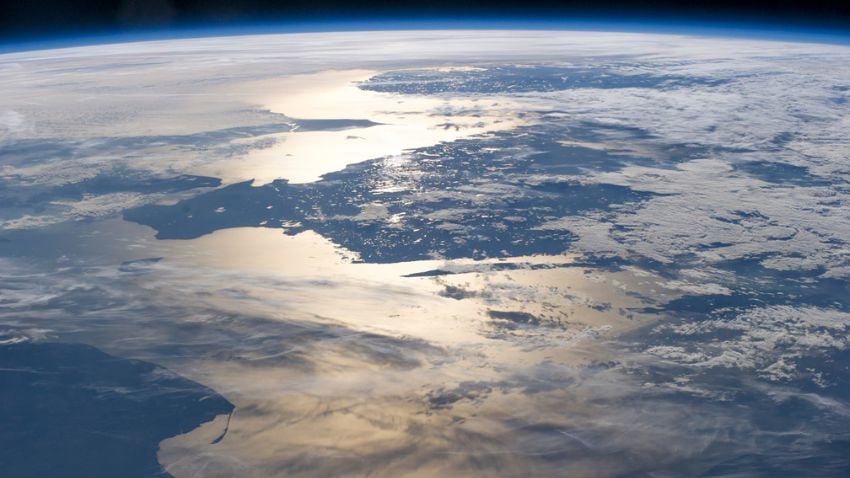
14 min read
Have you ever wondered where you'd be safe if the unthinkable happened? If those headlines of escalating tensions, border conflicts, and arms races weren't just posturing but sparked World War III? Where in the world will be safe if there is World War 3?
I bet you have. It's a chilling thought.
In today's swift atmosphere, disputes can rapidly emerge. But amidst that uncertainty lies opportunity: considering safer shores before storm clouds gather.
We're about to delve into that question no one wants to ask - 'Where in the world will be safe if there is World War 3?' We'll explore potential havens far from Europe and Asia’s flashpoints, understand practicalities for expats, ponder anti-war sentiments, NATO resistances, and controversial US support roles.
By the end of your journey, you'll view our unpredictable world from a fresh perspective. And who knows? You might even discover your own haven within it.
Make sure to grab your complimentary copy of 19 International Strategies To Protect And Grow Your Wealth Abroad and join our newsletter to stay up-to-date with the best news and content from the offshore and expat world every single week.
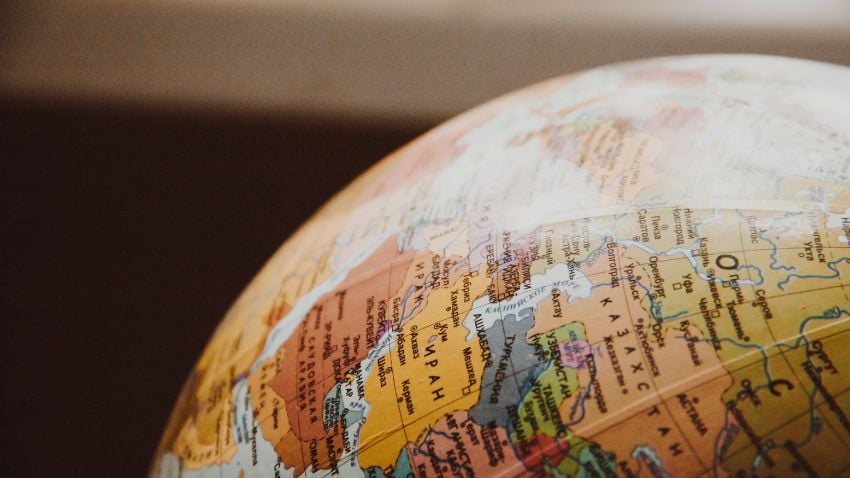
Growing tensions among major world powers, notably the active involvement of NATO, including US forces, in the situation in Ukraine, are escalating concerns
As freedom-loving individuals, it's crucial to be aware of conflicts that could disrupt our lives. Recent developments in international politics have led many to worry about a possible World War III.
Rising tensions between major world powers are fuelling these concerns. Particularly alarming is the situation in Ukraine, where NATO, including US forces, play an active role.
Ukrainian territory and its small population have been embroiled in conflict with Russia since 2014, which has escalated due to involvement from Western military alliances such as NATO. Many fear this geopolitical chess game might spark a world war, especially since it is difficult to identify who will use the nuclear warheads.
A stark illustration is how the US and its allies' engagement exacerbates matters by arming Ukraine against Vladimir Putin's Russia. It’s like pouring petrol onto an already roaring fire.
There's a further high-risk area across the planet in East Asia - Taiwan. The ongoing tussle between China and America over Taiwanese independence poses a further risk for potential escalation into full-blown war.
This confrontation isn't merely political posturing but also involves substantial military presence on both sides. Think two kids squaring off at school – only here they've got nuclear weapons.
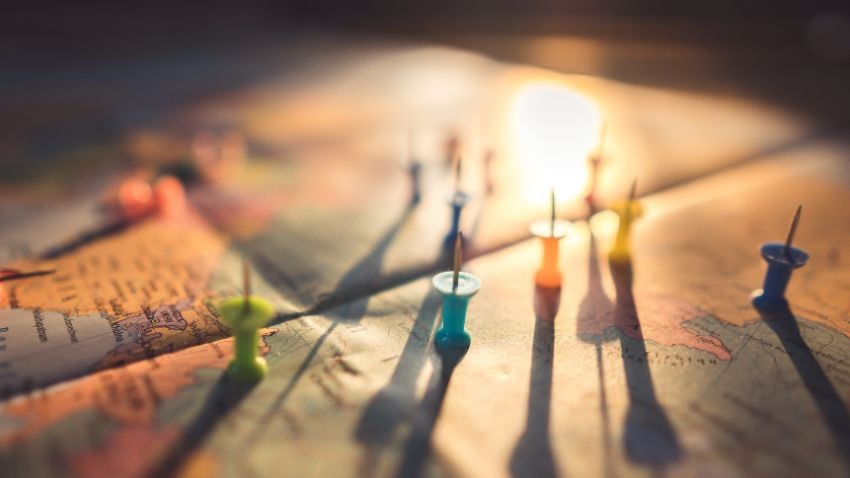
Amidst uncertain times, countries such as Uruguay, Brazil, Argentina, Paraguay, Panama, and Colombia are perceived as appealing safe havens
In 2023, the world watched in trepidation as tensions escalated once again between Israel and several Muslim states. Despite years of relative calm, a sudden resurgence of hostility has plunged these regions into uncertainty. From an anti-war perspective, it's disheartening to see history repeating itself with conflict rearing its ugly head yet again.
The situation in Gaza is equally alarming. The densely populated strip has become a battleground where ordinary citizens bear the brunt of political disputes and power struggles. As always, our sympathies lie not with any one side but with those innocent lives caught up amidst the chaos.
As the world stands on the precipice of potential global war, it's essential to consider where one might find safety and stability. South Korea and the USA continue to antagonize North Korea, a country with nuclear weapons and long-range missile capabilities. This tension is fuelling concerns about a possible World War III scenario.
In such uncertain times, countries like Uruguay, Brazil, Argentina, Paraguay, Panama, and Colombia appear as attractive safe havens due to their geographical distance from Europe or China - traditional epicentres of conflicts. These nations also boast food independence, water independence, and energy independence, three critical factors that ensure survival in any large-scale war situation.
Latin American countries are not just neighbouring countries geographically distant from key players in this geopolitical game but also countries that maintain neutral stances toward most international disputes. Their economies are relatively stable compared to other regions globally while offering high living standards and a good human development environment at affordable costs. If you are asking yourself where in the world will be safe if there is World War 3 without the risk of ending up with a nuclear bombing, you should consider Latin American countries.
Uruguay: Known for its political stability and progressive social policies, which make it an ideal place for expats looking for peace amidst chaos. Uruguay's strategic position outside major conflict zones and military conflicts with fertile land makes it an appealing choice, alongside being self-sufficient regarding basic necessities like food & water;
Brazil: Brazil offers a vast environment with fertile land, ensuring self-sufficiency during crises. The country presents opportunities due to its vast resources and distance from key conflict areas. Rich natural resources make Brazil largely independent regarding energy production;
Argentina: With rich agricultural lands, Argentina promises food security even under dire circumstances. The country sits well away from potential conflict zones;
Panama: This Central American nation has significant financial advantages, attracting many expats and businesses. A hub for expats, Panama offers a blend of modern conveniences and tropical charm;
Colombia: Boasting a diverse economy, Colombia offers a variety of opportunities for those looking to relocate their wealth or business. An increasingly popular choice among expats due to its improving safety record and vibrant lifestyle. With its vast biodiversity and mountainous terrain, Colombia provides ample resources to ensure self-sufficiency;
Paraguay: A lesser-known destination with promising prospects. Paraguay's low cost of living and welcoming attitude towards foreigners make it an attractive option. Paraguay is not only self-sufficient in terms of basic necessities but also maintains a neutral foreign policy. This country is likely well out of any nuclear fallout if things were to escalate in Europe.
All these countries offer not just geographical distance from the brewing storm but also varying degrees of food, water, and energy independence – critical factors in ensuring long-term sustainability during global crises. Moving oneself, one's wealth and business overseas might seem daunting. However, with the proper guidance and planning, it can be an effective strategy for privacy protection, legal tax reduction, and internationalization. It is about creating options in case things get out of hand back home, and that's a good reason to protect your family and your wealth.
In conclusion, it isn't appropriate here as this is not the end but just the beginning of your journey toward finding safe havens amidst conflicts. The time to act is now – before you're left without any choices at all.
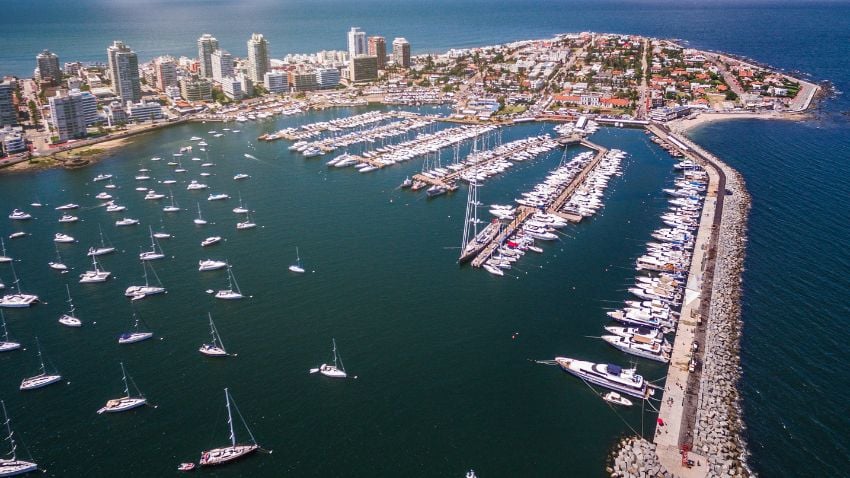
Aerial View of the Peninsula and Marina of Punta del Este, Uruguay
Amidst World War III's escalating global tensions and whispers, it's easy for fear to creep in. However, this article isn't about stoking that fear or encouraging panic buying of survival gear or telling you to strap a gas mask on your child's head. Instead, we want to explore practical solutions for those who value their freedom and peace - namely, relocation options away from potential war zones. We are interested in global peace, condemn nuclear missiles and chemical weapons, and are searching for a safe place in a peaceful country overseas.
In considering a safe haven during turbulent times, military neutrality is an essential factor. Countries with a longstanding history of non-alignment can offer relative safety as they're less likely to be dragged into international conflicts. Neutrality, both political and military, ensures these nations remain peaceful even when the world around them is at war.
Beyond neutrality, geographical location plays a crucial role, too. If there's an entire nuclear attack, you will be away from it. There are no potential invaders around, and the international community in these places is welcoming. It’s wise to consider countries far removed from Europe or China – the two regions most often associated with rising tensions leading up to WWIII scenarios.
All these countries offer not just geographical distance from the brewing storm but also varying degrees of food, water, and energy independence – critical factors in ensuring long-term sustainability during global crises. It’s about making informed decisions that prioritize your peace, freedom, privacy, and wealth protection while legally reducing tax liabilities through internationalization.
The idea is not to run scared but rather move smartly - considering all aspects before choosing your safe haven. Remember that relocating overseas isn't merely about escaping potential danger; it's an opportunity for growth, too - personal and financial. In Expat Money Show, we are committed to helping you navigate this journey successfully!
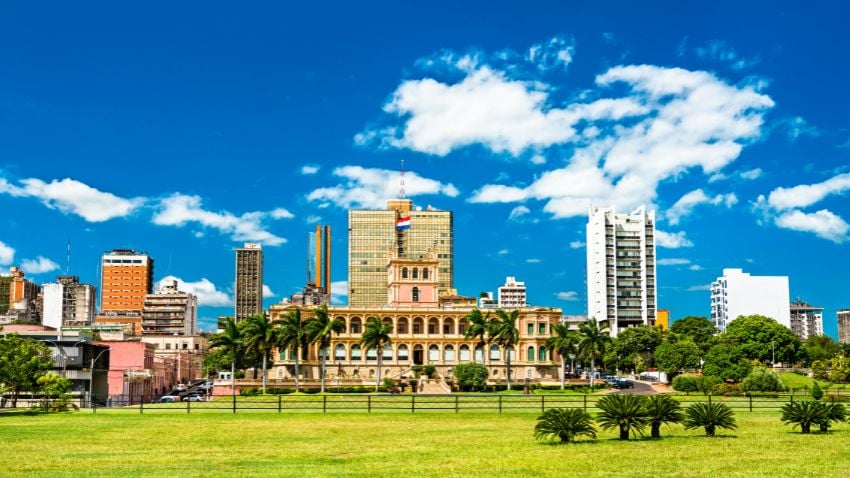
Palacio de Lopez in Asuncion, Paraguay
If you're considering moving away from potential conflict zones such as Europe, the Middle East, or China due to escalating global tensions, there are numerous countries around the globe offering food independence, water independence & energy independence along with the geographical distance from major theatres of potential warfare.
Moving yourself, your wealth or your business overseas could be a strategic decision that offers privacy, protection and legal tax reduction. It’s time to consider internationalization.
The conflicts are like dry timber, needing just a spark to ignite. A mishap in Ukraine or Taiwan could escalate quickly due to the major powers involved.
These flashpoints underscore why it's crucial for freedom-loving individuals seeking safety and stability to consider relocating. We’re not talking about running away but making smart moves – think chess, not checkers.
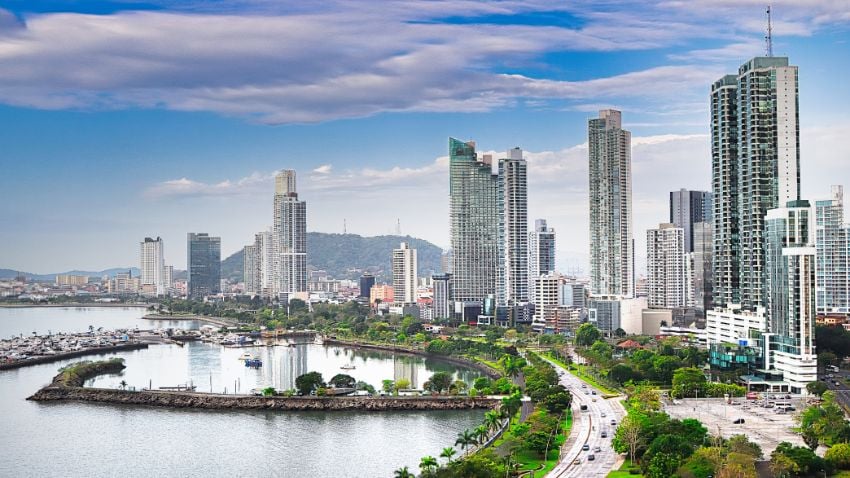
Panama City
Tiny island nations in the Pacific Ocean may seem like an ideal refuge in a global war. However, while these remote locations offer geographical safety and isolation from potential war zones, they present unique challenges regarding self-sustainability.
Small islands often lack sufficient arable land for agriculture. This makes them heavily reliant on imports to meet their food needs. For instance, The World Bank reports that many Pacific Islands import over 90% of their food due to limited agricultural capacity. Such dependence could become problematic if international trade is disrupted by warfare.
Freshwater availability can be another significant issue on small islands as many depend on rainwater or desalination plants for their water supply - both are vulnerable systems during times of crisis. According to a study published by Environmental Research Letters, even slight changes in climate patterns can severely affect freshwater availability on such islands.
Energizing an isolated island nation presents its own set of problems, too: most rely heavily upon imported fossil fuels for power generation, which would be greatly impacted during periods of global unrest. Asian Development Bank notes that some Pacific Island countries spend more than 10% of their GDP importing petroleum products. While renewable energy solutions like solar and wind power are increasingly being adopted, they still represent a small fraction of the overall energy mix.
The logistical challenges of reaching these remote locations cannot be underestimated either. Limited infrastructure can make it difficult to transport goods, particularly in times of crisis when resources may be diverted elsewhere or supply chains disrupted.
In summary, while Pacific island nations offer geographical isolation that could provide safety during the global war, their dependence on imports for food, water and energy creates vulnerabilities that potential expats must consider carefully before making such a move.
Don't fret if you're considering such a change. There are still tranquil retreats worldwide offering peace amid potential chaos. We'll delve into these safe havens in the following section.
|
Key Takeaway: Clued up on global tensions, like the escalating conflicts in Ukraine and Taiwan involving major world powers, is crucial for our freedom. But don't panic - we can make smart moves to seek safety amidst potential chaos by considering relocation to tranquil worldwide retreats. |
When considering safe locations during a potential global conflict, geographical location and self-sufficiency are vital. The ideal haven should be far from Europe, the Middle East and China while having food, water, and energy independence.
In South America, countries like Uruguay offer appealing options for safety. Known for its political stability and high quality of life, it's distanced from major global powerhouses that could become hotspots in case of World War III.
Brazil also comes into consideration with vast resources to ensure food and water security. Although larger economies may face challenges in times of turmoil due to their interconnectedness with the world economy, Brazil has proven resilient before, with a peaceful foreign policy.
Moving further southwards on the continent takes us to Argentina, which is rich in natural resources and clean water, including fertile soil for agriculture and ample freshwater supplies. This makes this country attractive when looking at basic needs such as sustenance during troubled times.
The merits don't stop there; Paraguay is another viable option thanks to its hydroelectric capacity - one of the highest per capita globally – making it virtually energy-independent. It can provide a stable electricity supply even if fuel imports are disrupted due to war or economic sanctions elsewhere in the world.
Panama, although not geographically distant from North America compared to other South American nations, benefits significantly by being outside any direct military conflict zones.
Last but not least on our list is Colombia, boasting rich biodiversity capable of supporting population needs independently. Despite past internal conflicts, they've managed well against odds, providing hope they'd do so again under extraordinary circumstances like a world war.
Remember, each of these countries has unique strengths that could provide safety and stability in times of global war. It is vital to investigate thoroughly and consult specialist counsel prior to making any major choices.
|
Key Takeaway: Where in the world will be safe if there is World War 3? Think South America. Countries like Uruguay, Brazil, Argentina and Paraguay are rich in natural resources, ensuring food and energy independence. Colombia's biodiversity adds to its appeal, while Panama benefits from being outside direct military zones. Do your homework, though - these places each have unique strengths but require a thorough research before any big decisions. |
Relocating to another country is no small feat. But in times of global war, such a move could be crucial. It's not just about picking up and going; you need to prepare adequately.
Navigating immigration procedures can feel like navigating a labyrinth. You'll face plenty of paperwork and potentially long wait times before getting your approval stamp.
The first step usually involves securing an appropriate visa or residency permit. The Expat Money guidebook series, particularly our detailed guide on moving to Mexico, provides valuable insights into these processes.
The requirements will vary based on your chosen destination but often include proof of financial independence or employment prospects within the new country. Criminal background checks and medical tests are also required.
Moving abroad isn't only about cutting through red tape; it’s also about adapting to a new lifestyle in places as diverse as Uruguay, Brazil, Argentina, Paraguay, Panama or Colombia. So let’s chat adjustments...
You’ll find yourself immersed in unfamiliar customs that might seem odd at first but eventually become part of everyday life. These differences range from food preferences to social etiquette rules — even how people perceive time.
Cuisine: Whether it's feijoada in Brazil or parrillada in Argentina – adjusting your palate is one thrilling aspect;
Social Etiquette: Learn when 'now' really means 'an hour from now', what hand gestures mean differently here, or why people kiss each other on the cheek in greeting;
Language: If you're not already fluent, you’ll need to learn at least basic phrases. In many of these countries, English isn't widely spoken outside major cities and tourist areas.
If you have family obligations and must stay closer to the US, moving to Mexico might be a good option. Our book on Mexico delves into the nitty-gritty of adjusting your lifestyle, providing a wealth of insights across 475 detailed pages. From tackling cultural differences to understanding local customs and practices, this guidebook is designed with expats in mind.
Moving abroad with your family may not be an easy task, but as an expat with skin in the game, I can say that there are ways to make this process smoother. In this episode of the Expat Money Show, I offer tips, tricks, and strategies for moving abroad with your family.
|
Key Takeaway: Moving to another country during the global war demands more than just packing your bags. It's about navigating the maze of immigration procedures, securing visas and adjusting to new lifestyles in potentially unfamiliar lands like Uruguay or Brazil. From tasting exotic cuisines to learning local etiquette and languages, becoming an expat is a journey filled with exciting challenges. |
The present-day world is not without its clashes and disagreements. As we ponder the safety of different regions in case of a potential World War III, it's worth noting that there are forces actively working against such an outcome.
In this regard, alternative media platforms have proven to be instrumental. They play a vital role in shaping public opinion and promoting anti-war sentiments across societies worldwide. A notable example is Antiwar.com, known for its commitment to peace and non-interventionism.
This website continually publishes news stories and thought-provoking opinion pieces with an anti-war stance. It provides a platform where readers can stay informed about global developments while encouraging them to critically assess their governments' foreign policies.
A key figure behind Antiwar.com's success is Dave DeCamp, who wears multiple hats as the site’s news editor and podcast host for AntiWar News. His work involves reporting on current events through an unbiased lens, offering his audience perspectives that often challenge mainstream narratives.
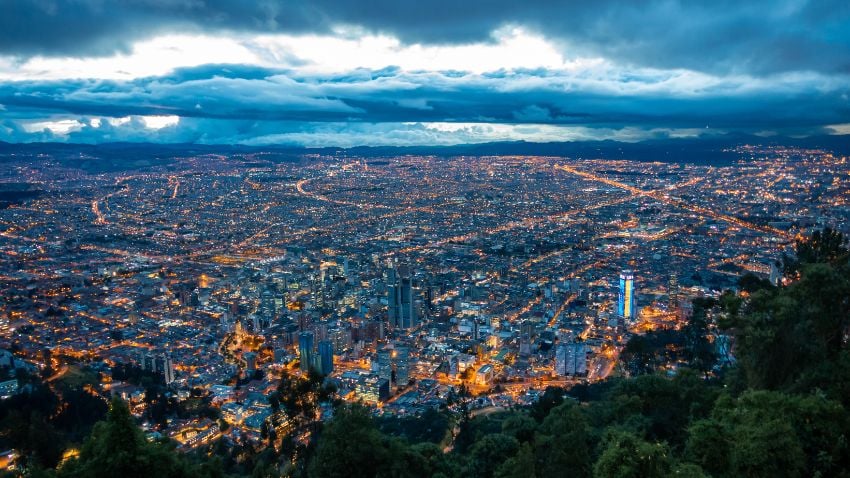
Panoramic view of Bogota, Colombia
We see these ideals taking shape beyond digital spaces, too - reflected within nations advocating neutrality or non-intervention during conflicts between superpowers.
Countries like Switzerland offer us valuable lessons on maintaining neutrality amidst international tensions successfully. Despite being geographically nestled among EU countries frequently involved in global affairs, Switzerland has managed to maintain political autonomy by refraining from joining military alliances.
Another great example is Costa Rica, a nation without an army. It shows us that national security can be ensured without the need for militarization, and peaceful diplomacy can effectively resolve disputes.
It's not just about steering clear of wars, you see. These non-interventionist views also shed light on how countries can work towards and maintain lasting peace.
|
Key Takeaway: Global wars may seem inevitable, but remember, many voices are working to prevent World War III. Media outlets like Antiwar.com foster critical thinking about governments' foreign policies, and countries such as Switzerland and Costa Rica exemplify how neutrality and peaceful diplomacy can contribute to a more secure world. |
NATO, while a united front on paper, is no stranger to internal resistance. Two countries that have made waves in this regard are Turkey and Hungary.
Turkey has been a key player within NATO due to its strategic location between Europe and Asia. Yet, it has also demonstrated resistance against some of the alliance’s actions. One noteworthy instance is their active role in brokering peace talks during various conflicts.
In late 2023, for example, they stepped forward as an intermediary between Russia and Ukraine. Their unique position within NATO allowed them leverage to promote dialogue rather than escalation.
Hungary's situation differs from Turkey's but remains equally intriguing. While not traditionally seen as influential within the military bloc like their Turkish counterparts, they've shown resilience when standing up for national interests over collective ones.
In recent years, Prime Minister Viktor Orbán has gained attention with his nationalist rhetoric that often contradicts mainstream EU policies – including those endorsed by other NATO members.
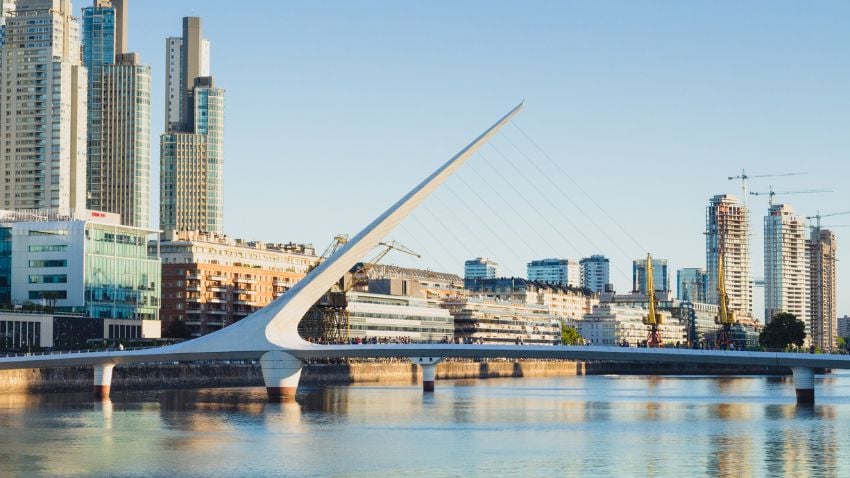
Puerto Madero, Argentina
Particularly interesting about these cases is how both nations have leveraged positions inside different international bodies. Hungary has utilized its EU status to voice resistance against choices that infringe on national autonomy.
They have also sought alliances with other Eastern European countries like Poland and the Czech Republic. This gives them more clout when challenging policies they believe harm their interests.
Turkey and Hungary’s actions within NATO raise essential questions about balancing national interest against collective security in international relations.
While some argue this resistance threatens alliance unity, others say it provides a necessary counterweight to unchecked consensus-building within such powerful organizations.
The cases of Turkey and Hungary could be seen as signs of a shifting dynamic within NATO.
|
Key Takeaway: Despite NATO's unity on paper, Turkey and Hungary highlight the complexities of balancing national interests with collective security. Turkey uses its strategic position to broker peace talks, while Hungary leverages its EU membership to challenge decisions affecting sovereignty. These instances suggest a shifting dynamic within NATO. |
The US has been sending millions of tax dollars and providing military support to Ukraine, an aggressive move towards Russia. This isn't just about weapons. It's also about intelligence sharing and training of Ukrainian personnel by NATO forces. This isn't happening without controversy. Questions are being raised about the likelihood of the war escalating with Russia and World War III breaking out.
A similar situation is unfolding on the other side of the world, where the US continues its commitment to defend Taiwan from any threat posed by China. Again, there are fears that this could spark global wars if not managed properly.
Military aid goes beyond guns and tanks; it's also about offering expertise and intelligence. The information shared between nations can provide valuable insights into enemy strategies or plans - giving them an upper hand during war.
This military aid does come at a cost – rising global geopolitical tensions. While some on the left view these actions as necessary defensive measures against aggressive powers like Russia or China, libertarian-minded individuals fear they might escalate the situation, leading us closer to a World War III scenario.
Countries such as Brazil and Uruguay, distant from these areas both in terms of location and political views, are not all in agreement regarding these struggles. Countries like Brazil and Uruguay are far removed from these flashpoints, both geographically and politically.
The US finds itself walking a tightrope here – trying to weaken Russia while preventing an escalation into a full-blown nuclear war. It’s clear there’s no easy answer; every move needs careful thought about potential consequences.
Given the delicate nature of international affairs, it is paramount for those considering expatriation to have a thorough understanding of this intricate situation.
|
Key Takeaway: Understanding the Complexities: The US military aid to Ukraine and Taiwan isn't just about weaponry but also includes intelligence sharing. But such support risks escalating tensions with Russia and China. This delicate balancing act demands careful consideration of potential consequences - vital knowledge for anyone contemplating expatriation. |
Global wars can be unnerving...
But the key takeaway is, even in World War III scenarios, there are potential safe havens for you and your family if you have the forethought to set up your plan-b destination. Some of the safest countries in this scenario are in South America, like Uruguay, Brazil, Paraguay, and Argentina could offer refuge due to their geographical distance from main flashpoints.
Moving abroad has its challenges...
Navigating immigration procedures or adapting to a new culture isn't easy. It's possible to surmount the difficulties of shifting abroad with a systematic approach and an open outlook.
The world may seem on edge...
Yet amidst these tensions lie seeds of resistance: anti-war sentiments growing stronger, Turkey and Hungary showing NATO defiance, and alternative media shaping public opinion against the war.
In the end, asking 'Where in the world will be safe if World War 3?' isn’t just about finding physical safety...
It’s also about discovering resilience within ourselves – adapting to change, understanding geopolitics better and making informed decisions for our future safety. Here's hoping we'll never need such measures, but knowledge surely arms us well for whatever lies ahead.
If you want the best intel from the expat world, including profitable offshore opportunities, little-known tax-saving strategies, and hard-won insights on immigration, passports, and Plan-B residencies, all delivered to your inbox every single week, then join our daily correspondence, EMS Pulse®. Currently enjoyed by over 84,000 expats and expat-hopefuls worldwide. Fill in the form below to join our newsletter free:

Written by Mikkel Thorup
Mikkel Thorup is the world’s most sought-after expat consultant. He focuses on helping high-net-worth private clients to legally mitigate tax liabilities, obtain a second residency and citizenship, and assemble a portfolio of foreign investments including international real estate, timber plantations, agricultural land and other hard-money tangible assets. Mikkel is the Founder and CEO at Expat Money®, a private consulting firm started in 2017. He hosts the popular weekly podcast, the Expat Money Show, and wrote the definitive #1-Best Selling book Expat Secrets - How To Pay Zero Taxes, Live Overseas And Make Giant Piles Of Money, and his second book: Expats Guide On Moving To Mexico.

Honduras’ newly elected president, Nasry Asfura of the conservative National Party, was sworn in on January 27, 2026. The election, held on November...

For a growing number of Americans, cost-of-living math no longer works. Housing feels harder to reach, everyday costs keep climbing, and long-term...
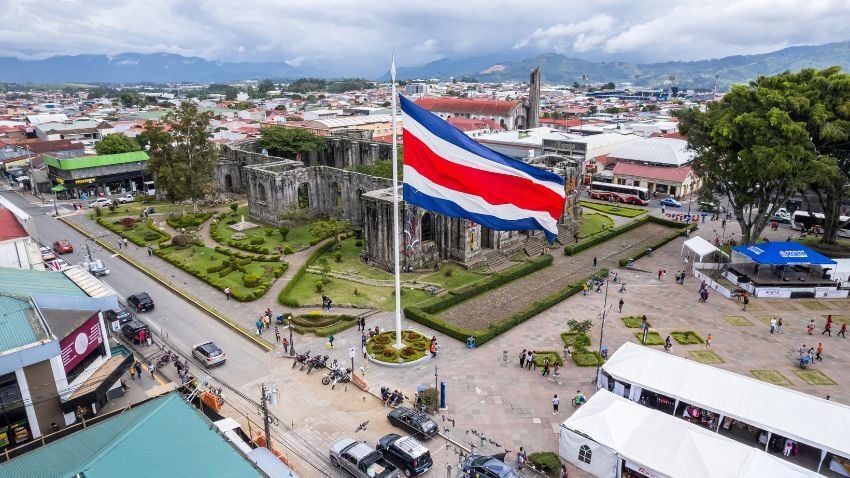
Costa Rica has become one of the most popular expat and digital nomad destinations in Latin America, known for its natural beauty, relaxed lifestyle,...